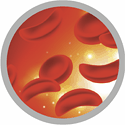
Sickle cell anemia is one of the most frequently occurring genetic disorders that affect red blood cells. While people of African descent are most likely to be affected, the disease can also affect those of Hispanic, Arabic, Indian or Mediterranean descent. Sickle cell related conditions are found in 1 in 12 African-Americans.
What is Sickle Cell Anemia?
Sickle cell anemia (SCA) is an inherited disorder of the red blood cells that causes them to change from their normal shape, carry less oxygen, and die sooner than ordinary red blood cells. As a result, the organs of the body are deprived of all the oxygen they need, causing pain, fatigue, shortness of breath, and other symptoms that can be severe.
Children are born with sickle-cell related health problems when one or both parents carry genes for SCA. Parents can be carriers without knowing it, and without having any symptoms themselves.
Sickle Cell Anemia Symptoms
Sickle cell anemia can cause pain, infections and damage to body organs. The pain symptoms of sickle cell anemia appear during a period called a crisis. A crisis can last from a few hours to a week in length. Other symptoms of sickle cell anemia include fever; pain in hands, feet and joints; shortness of breath; pneumonia-like symptoms; dizziness; headache; sores on the legs and an enlarged spleen or liver.
All babies born in Mississippi are tested for sickle cell anemia and the sickle cell gene. Babies with SCA are referred to medical specialty care soon after birth for treatment.
Sickle Cell Trait
When a child inherits the gene for sickle cell anemia from just one parent, it's referred to as sickle cell trait. Sickle cell trait does not cause anemia. However, when other common genetic conditions are present, sickle cell trait can cause symptoms like those of sickle cell anemia. These symptoms can appear when you engage in strenuous activities or sports. You can experience shortness of breath, coldness in the hands and feet, pale skin, chest pain or headaches. And if you have sickle cell trait, you are at risk of having a child with either sickle cell trait or sickle cell disease.
Should I Be Tested?
A blood test is the only certain way to tell whether you have a sickle cell condition, or carry a sickle cell gene. If you plan to have a child, both you and your partner should be tested. If you have sickle cell trait there is a chance you could pass the abnormal gene to your baby.
Sickle Cell Disorders in Mississippi
These are the most frequently confirmed varieties of sickle cell diseases in Mississippi:
- Sickle Cell Anemia: an abnormal "hemoglobin S" gene is inherited from both parents.
- Hemoglobin SC Disease: an abnormal hemoglobin S gene is inherited from one parent and a hemoglobin C gene is inherited from the other parent.
- Hemoglobin S in combination with Thalassemia: an abnormal hemoglobin S gene and a beta thalassemia gene are inherited.
- Hemoglobin C/Beta + Thalassemia: an abnormal hemoglobin C gene is inherited from one parent and a beta-thalassemia gene is inherited from the other parent.
More on Sickle Cell Anemia
- What You Should Know About Sickle Cell Disease PDF
- Sickle Cell Disease and Pregnancy PDF
- 5 Tips to Help Prevent Infection PDF
- Fact Sheet for Student-Athletes PDF
- Fact Sheet for Coaches PDF
- Mississippi Sickle Cell Foundation
- Video: The Student Athlete with Sickle Cell Trait
- More about sickle-cell related diseases
